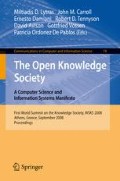Abstract
In this paper we quote a theoretical framework of information organization for the systemization of web-based educational resources. Based on this framework we present an ongoing experimental system aiming at the establishment of alternative communication and collaboration scenarios among educators. For an objective substantiation of information, various evaluation criteria have been developed such as Functional, Pedagogic and Didactic ones.
Access this chapter
Tax calculation will be finalised at checkout
Purchases are for personal use only
Preview
Unable to display preview. Download preview PDF.
References
Kron, F.W., Sofos, A.: Media Didactic. Gutenberg, Athens (2007)
Skinner, B.F.: Wissenschaft und menschliches Verhalten. Kindler Verlag, München (1973)
Klaus, D.: Eine Analyse der Programmierungstechniken. In: Glaser, R. (Hrsg.) (ed.): Programmiertes Lernen und Unterrichtstechnologien, Deutsche Ausgabe Flechsig, K.-H./Schultze, W. Cornelsen Verlag, Berlin (1971)
Gange, R.M.: Die Bedingungen des menschlichen Lernens. Beltz Verlag, Hannover/Dortmund/Darmstadt/Berlin (1980)
Piaget, J.: Theorien und Methoden der modernen Erziehung. Fisher Verlag, Wien/Zürich/München (1972)
Cube, F.v.: Kybernetische Grundlagen des Lehrens und Lernens. Kettler Verlag, Stuttgart (1965)
Bruner, J.S.: Der Prozess der Erziehung 5. Schwan Verlag, Aufl. Berlin/Düsseldorf (1980)
Maturana, H.R., Varela, F.J.: Der Baum der Erkenntnis. Die biologischen Wurzeln menschlichen Erkenntnis. Goldmman Verlag, Bern (1987)
Vygotsky, L.: Notion and Language. Knowledge Publications, Athens (1988)
Mandl, H., Gruber, H., Renkl, A.: Situiertes Lernen in multimedialen Lernumgebungen. In: Klimsa, I. (ed.) Information und Lernen mit Multimedia und Internet, pp. 139–150. BeltzPVU, Weinheim (2002)
Brown, J.S., Collins, A., Duguid, P.: Situated Learning and the Culture of Learning. Education Researcher 18(1), 32–42 (1989)
Kron, F.W.: Grundwissen Padagogik’ 6. Auf. Reinbardt, Munchen (2001)
Oevermann, U.: Sozialisationstheorie. Ansätze zu einer soziologischen Sozialisationstheorie und ihre Konsequenzen für eine allgemeine soziologische Analyse. In: Lüschen, G. (ed.) Deutsche Soziologie seit 1945. Entwicklungsrichtungen und Praxisbezug. Kölner Zeitschrift für Soziologie und Sozialpsychologie, pp. 143–168 (1979)
Doering, N.: Sozialpsychologie des Internets. Die Bedutung des Internets fuer Kommunikationsprozesse, Identitaet, soziale Beziehungen und Gruppen. Bern, Toronto, Seatle, Horgefe, Goettingen (1999)
Seufert, S.: Virtuelle Lerngemeinschaften: Konzept und Potenziale für die Aus-und Weiterbildung. Ergebnisbericht des Bundesinstitut für Berufsbildung (BIBB) (2002)
Reinmann-Rothmeier, G., Mandl, H., Erlach, C.: Wissensmanagement in der weiterbildung. In: Trippelt, R. (ed.) Handbuch Erwachsenenbildung/Weiterbildung s, pp. 753–768. Leske + Budrich, Opladen (1999)
Sofos, A., Kostas, A.: Models of Information Organization: A Web-based Environment for Multi-criteria Organization of Educational Resources. In: 4th International Conference in Open and Distance Learning (ICODL2007), Athens, Greece. Open Access and Distance Education, Forms of Democracy in Education (2007)
Sofos, A., Kostas, A.: Development of Pedagogy Criteria for the Substantiation and Evaluation of Educational Resources on the Web. In: 4th National Conference ICT in Primary Education, Pireus, Greece (2007)
Dragulanescu, N.: Website Quality Evaluations: Criteria and Tools. The International Information & Library Review 34(3), 247–254 (2002)
Olsina L., Lafuente G., Rossi G.: Specifying Quality Characteristics and Attributes for Websites, Retrieved on 10 September 2006 (2001), http://plinks.ebscohost.com/ehost/results;vid=4&hid=1&sid=7f679419-0354-45cc-834c-895796963fb3%40sessionmgr4
Beck, E. S.: The Good, The Bad & The Ugly or, Why It’s a Good Idea to Evaluate Web Sources (2006), Retrieved on 10 September 2006, http://lib.nmsu.edu/instruction/evalcrit.html
Lesley University, Evaluating Web Sites Criteria for the Classroom (2005), Retrieved on 01 September 2006, http://www.lesley.edu/library/guides/research/evaluating_web.html
Kapoun, J.: Teaching undergrads WEB evaluation: A guide for library instruction. C&RL News, pp. 522–523 (1998)
McInerney, C.R., Bird, N.J.: Assessing Website quality in context: retrieving information about genetically modified food on the Web, Retrieved on 10 September 2006 (2005), http://informationr.net/ir/10-2/paper213.html
Payton, T.: Web Evaluation, Retrieved on 10 September 2006 (1997), http://www.siec.k12.in.us/west/edu/rubric3.htm
McLachlan, K.: WWW cyberguide ratings for content evaluation, Retrieved on 10 September 2006 (2002), http://www.cyberbee.com/content.pdf
Polyani, M.: The Tacit Dimension. Lawrence Elbaum Associates, London (1967)
De Paula, R.: Active Learning Networks: Designing for Computer Supported Social Networks in Special Education Environments. In: ECSCW 2003 Workshop on Social Networks, Helsinki (2003)
Kerres, M.: Multimediale und telemediale Lernumgebungen. Konzeption und Entwicklungen. München (1998)
Komis, B.: Introduction to Educational Applications of Information and Communication Technologies. New Technologies Publications, Athens (2004)
Schmidt, S.: Geschichten und Diskursen. Abschied vom Konstruktivismus. Hamburg (2003)
Baile, D.K.: Typologies and Taxonomies An Introduction to Classification Techniques. SAGE Publications, Thousand Oaks (1980)
DELPHI: Information Intelligence-Content Classification and the Enterprise Taxonomy Practice, DELPHI Group Report (2004)
Author information
Authors and Affiliations
Editor information
Rights and permissions
Copyright information
© 2008 Springer-Verlag Berlin Heidelberg
About this paper
Cite this paper
Sofos, A., Kostas, A. (2008). Collaborative Work and Multi-criteria Organization of Web Educational Resources: A Theoretical Framework. In: Lytras, M.D., et al. The Open Knowlege Society. A Computer Science and Information Systems Manifesto. WSKS 2008. Communications in Computer and Information Science, vol 19. Springer, Berlin, Heidelberg. https://doi.org/10.1007/978-3-540-87783-7_30
Download citation
DOI: https://doi.org/10.1007/978-3-540-87783-7_30
Publisher Name: Springer, Berlin, Heidelberg
Print ISBN: 978-3-540-87782-0
Online ISBN: 978-3-540-87783-7
eBook Packages: Computer ScienceComputer Science (R0)

